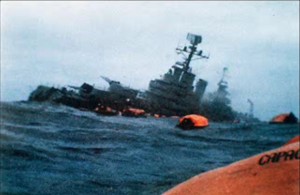Clive Ponting: The Government cover-up:
Analysis: The Seven Lies – ‘political control of the military’ and Conqueror’s response
Transcript:
I would like to start … I think – I suppose because it was where I got involved in this whole saga – with the fact that there had been a consistent and deliberate cover-up by the British government of the facts surrounding the sinking of the Belgrano, for two years. Now, what ever one might think about the standards of British government, it is unusual to say the least, to see it sustain in such a deliberate way a series of deliberately miss-leading and incorrect statements, and refusals to answer questions, and so on …
Now I think you have got to ask yourselves; “Why was the Government doing it?” and at the moment nobody has managed to get to the bottom of what it is. I think there are probably two explanations, which are not mutually exclusive, in fact they may well both be true. There is a whole Peruvian aspect as Willy Makin has already stated.
The other is that the British government themselves actually thought the sinking of the Belgrano was, if not illegal, so near to it in international law, and it put them in such an embarrassing position with international public opinion, that they had to conceal the real reasons for their actions, and that their whole strategy of trying to show that all their actions during the Falklands War were immediate reactions to deliberate Argentine provocation, was not in fact true.
And the sort of evidence that we were discussing yesterday, shows that the British government at the time, and the Foreign Secretary and the Attorney General, believed that the actions that were being taken at the end of April and the beginning of May 1982 were not in fact legal in international law.
But these questions have been around now for four years, and they have never yet been properly answered or investigated. I think this comes back to one of the crucial problems in Britain … and that is the accountability of Government, because British government is not really accountable to anybody in the last resort.
The problem is that in the House of Commons they control the majority and, unlike say the American Senate, the MPs of the majority party, in the last resort when the pressure is on, will vote to support the government. They don’t have their own independent power base that they can use to criticise the government.
The Select Committee system is also designed in the last resort to back up the government, because the government MPs have a majority on every Select Committee. And as Ian Mikardo found during the Foreign Affairs Committee investigation of the Belgrano sinking, obviously for public opinion they had to go through the motions and conduct an inquiry, but every time they got to the crucial issues and were asking the crucial questions, the Tory majority voted not to ask the questions, and not to seek further evidence.
Now under the British system there is no way you can get round this. What other methods are open if we are to take the issue any further? I mean the Select Committee has obviously reached the end of the road … I mean not only has the Majority Report virtually whitewashed the government’s actions, but the dissenting Minority Report by the Labour Party has been ignored, and not even debated in the House of Commons.
We could I suppose have a committee of Privy Councillors to investigate, but I don’t believe that the Franks Committee Report would give us much confidence in the outcome of the establishment looking yet again at the actions of the establishment during the sinking of the Belgrano.
The only other possibility would be the setting up of a Tribunal of Inquiry, taking evidence under oath under the 1921 Act. But again to set it up there has to be a majority vote in both Houses of Parliament and obviously under the current government there will not be such a vote. So we are left in the end with the fact that the government, if it chooses not to be accountable, or finds difficulties, can always find ways round problems, and not be accountable either to Parliament or public opinion.
And if as Willie is saying, documents exist inside the Foreign Office, and may well be known to a number of civil servants, who are then placed in an extremely difficult position of knowing what to do about it, even if they know the Government is still lying about the Peruvian Peace Plan.
So we are left with this whole situation I think, where British Government, in a crisis, is left unaccountable, where we don’t have the American system as was shown in Watergate where people were prepared to actually take on the government. We don’t have much of an independent legal system in this country either, except in the last resort, as I was lucky enough to discover (Laughter).
So, I mean I think we are left with this over-riding question … not only have we not yet got to the bottom of the sinking of the Belgrano, we haven’t yet got to the bottom of the problem of how you make British Government accountable both to Parliament and public at the same time.

